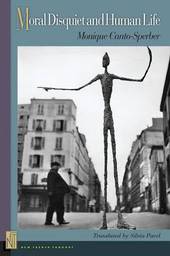
|
Moral Disquiet and Human Life
Paperback / softback
Main Details
| Title |
Moral Disquiet and Human Life
|
| Authors and Contributors |
By (author) Monique Canto-Sperber
|
|
Translated by Silvia Pavel
|
| Series | New French Thought Series |
|---|
| Physical Properties |
| Format:Paperback / softback | | Pages:232 | | Dimensions(mm): Height 235,Width 152 |
|
| Category/Genre | Ethics and moral philosophy |
|---|
| ISBN/Barcode |
9780691164670
|
| Classifications | Dewey:170 |
|---|
| Audience | | Tertiary Education (US: College) | | Professional & Vocational | |
|---|
|
Publishing Details |
| Publisher |
Princeton University Press
|
| Imprint |
Princeton University Press
|
| Publication Date |
31 August 2014 |
| Publication Country |
United States
|
Description
Attempting to steer moral philosophy away from abstract theorizing, Moral Disquiet and Human Life argues that moral philosophy should be a practical, rational, and argumentative engagement with reality, and that moral reflection should have direct effects on our lives and the world in which we live. Illustrating her discussion with vivid examples f
Author Biography
Monique Canto-Sperber is a philosopher and the director of the Ecole normale superieure in Paris. She is the author of many books on philosophy and classics, and is the editor of Le Dictionnaire d'ethique et de philosophie morale.
Reviews"[A]n extremely rich and wide-ranging work, written by one of the foremost contemporary moral philosophers in France... Without at all sacrificing rigor, [Monique Canto-Sperber] demonstrates in a most resounding way that philosophy at its very best is plentiful in its resources to speak quite illuminatingly to the circumstances of life that agonize us so."--Laurence Thomas, Ethics "Canto-Sperber not only holds up the history of moral philosophy as relevant and insightful, but she retells the grand story in her own fashion. Anglophones will find her narrative of the Ancients, her homage to the pre-Moderns (like Anselm), her 'inside story' approach to the existentialists, and her comparisons of French philosophers to non-French thinkers, both entertaining and revealing. But her incisive critique of the Enlightenment project of secularization, written in a dramatic and ever-surprising style of prose, is what makes this work unique and provocative."--Albert D. Spalding, Philosophy in Review
|